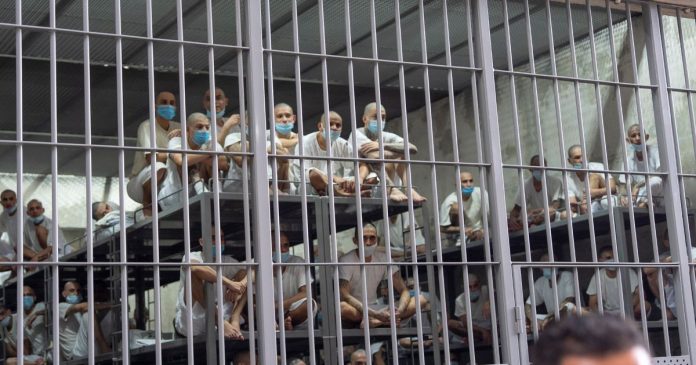An El Salvador prison infamous for its brutal regime is to double its size as Donald Trump threatens to send US criminals to the country. CECOT is a maximum security mega-prison in Tecoluca, El Salvador where tens of thousands of prisoners are locked up in rows of metal bunks and have to endure a harsh existence.
Cells have two toilets and a basin which are open with no privacy while there are no windows and they are watched by guards from holes in the mesh ceiling. Hundreds of immigrants have been taken there from the US by the Trump administration and he has also spoken about sending homegrown criminals.
And possibly to fit all the new inmates, El Salvador’s leader Nayib Bukele is understood to have told the US Homeland Security Secretary Kristi Noem that he plans to increase the size.
Currently the huge prison has a maximum of 40,000 inmates but Bukele is looking at increasing it to 80,000. “He has plans to double the size. He has 80-plus acres there that he’s going to continue to build on,” Ms Noem told the Wall Street Journal.
In another indication of Bukele’s intentions, when he met with Trump on Monday, he responded to the US president saying he needed to build more prisons by stating: “We’ve got space.”
Trump has said he would like to find “legal” ways to ship US citizens to the El Salvador prison and on Monday insisted these would just be “violent people”. He implied they would be those already convicted of crimes in the United States, though he’s also floated it as a punishment for those who attack Tesla dealerships to protest his administration and its patron, billionaire Elon Musk.
But it would likely be a violation of the US Constitution for his administration to send any native-born citizen forcibly into an overseas prison. The Constitution also prohibits “cruel and unusual punishment,” and one of CECOT’s selling points is that conditions there are far harsher than in prisons in the U.S.
“It is illegal to expatriate US citizens for a crime,” wrote Lauren-Brooke Eisen of the Brennan Center for Social Justice in New York. She noted that even if the administration tries to transfer federal prisoners there, arguing they’re already incarcerated, it could run afoul of the First Step Act that Trump himself championed and signed in 2018.
The provision requires that the government try to house federal inmates as close to their homes as possible so their families can visit them — and indeed transfer anyone housed farther than 500 miles from their home to a closer facility.
There is one potential loophole that the administration could use to send a small group of citizens to El Salvador. They can try to strip the citizenship of people who earned it after immigrating to the United States.
As tension between the White House and Europe heats up, the Mirror has launched its very own US Politics WhatsApp community where you’ll get all the latest news from across the pond.
We’ll send you the latest breaking updates and exclusives all directly to your phone. Users must download or already have WhatsApp on their phones to join in.
All you have to do to join is click on this link, select ‘Join Chat’ and you’re in! We may also send you stories from other titles across the Reach group.
We will also treat our community members to special offers, promotions, and adverts from us and our partners. If you don’t like our community, you can check out any time you like. To leave our community click on the name at the top of your screen and choose Exit group. If you’re curious, you can read our Privacy Notice.
People who were made US citizens after birth can lose that status for a handful of offences, like funding terrorist organizations or lying on naturalization forms. They would then revert to green card holders, and would be potentially eligible for deportation if convicted of other, serious crimes.
That’s a small, but real, pool of people. Perhaps the most significant thing about it is that it would require loss of citizenship first. In other words, there’s still likely no legal way to force a citizen out of the country. But a few could end up in legal jeopardy anyway.
At Reach and across our entities we and our partners use information collected through cookies and other identifiers from your device to improve experience on our site, analyse how it is used and to show personalised advertising. You can opt out of the sale or sharing of your data, at any time clicking the “Do Not Sell or Share my Data” button at the bottom of the webpage. Please note that your preferences are browser specific. Use of our website and any of our services represents your acceptance of the use of cookies and consent to the practices described in our Privacy Notice and Cookie Notice.


